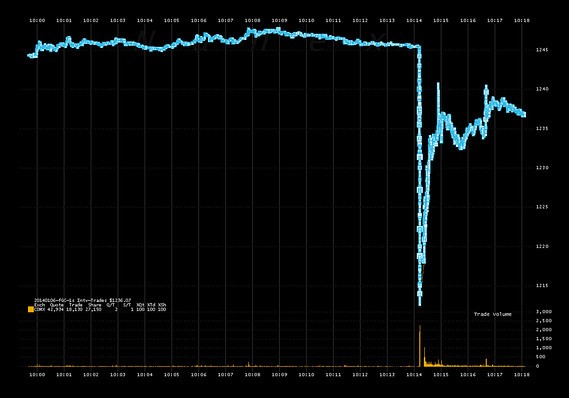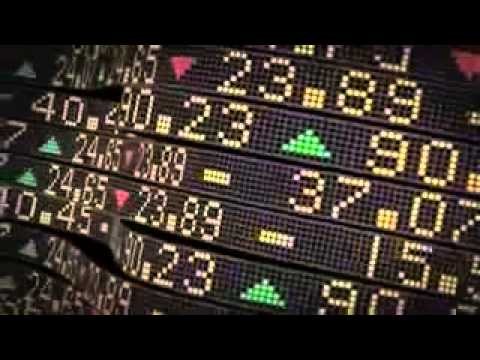What s Behind the Crash in the Gold Market
Post on: 12 Июль, 2015 No Comment

Related
One of the more interesting phenomena to take place in the markets in recent memory has been the seemingly invincible rise in the value of gold. In the decade between 2001 and 2011, the price of gold rose from $256 per oz. to a high of $1,920 — a whopping 650% return for those lucky enough to have timed the trade perfectly.
But since 2011, the gold market has shown signs of weakness, culminating in a multiday crash that began on Thursday and continued into Monday. According to the Wall Street Journal :
Gold futures for April delivery fell $140.40, or 9.4%, Monday to a two-year low at $1,360.60 an ounce on the Comex division of the New York Mercantile Exchange. That extended their bear-market descent of more than 20% from their 2011 all-time high. Since Thursday, gold prices have declined by more than $203 an ounce, a record skid since the futures began trading in the U.S. in 1974.
So whats behind the remarkable rise in the value of gold — and what changed in recent days that has undermined investor confidence in it?
The first thing gold skeptics like Warren Buffett will remind you about the precious metal is that it doesnt have nearly the utility of other commodities like oil or copper. Sure, we use it for jewelry or dental fillings, but mostly we just let it sit there. In 1998, Buffett famously quipped: Gold gets dug out of the ground in Africa, or someplace. Then we melt it down, dig another hole, bury it again and pay people to stand around guarding it. It has no utility. Anyone watching from Mars would be scratching their head. Its true: unlike stocks, gold doesnt pay a dividend. And unlike oil, it isnt a vital commodity that powers other parts of the economy.
Though Buffett may be justified in personally shying away from investing in the shiny metal, in other respects he underplays its significance. Gold has held an enduring place in human history, and a central role in international monetary policy from the early 19th century until 1971. The so-called gold standard — a system in which national currencies were ultimately redeemable for a fixed amount of gold — was the law of the land in much of the world until 1971, when Richard Nixon formally severed the convertibility of the dollar. Since that time, governments across the world have been in the peculiar position of having their currency backed by nothing more than faith. For instance, under this system, the U.S. could theoretically print and spend money endlessly, with no fear that its spending of dollars would deplete its stock of gold.
Since 1971, this era of floating currencies has been a contributing factor in developed countries ability to take on more and more debt, a dynamic that has reached new highs since the financial crisis. The rise of gold in recent years can be explained in part by investors understandable lack of confidence in governments ability to keep their debt under control, and therefore the value of their currencies high. In fact, central banks across the world in recent years have also diversified their holdings into gold as a hedge against a decline in the value of the dollar.
In addition, it has become much easier for the average investor to invest in gold through exchange-traded gold funds or derivatives.
All of these factors have contributed to golds rise, but what about its recent crash? Its impossible to pinpoint the exact cause of any market correction, and analysts have floated a range of possible reasons, from the Cypriot central banks need to sell off some its gold reserves to pay for its bailout to recent data showing weakness in the Chinese economy. But nobody knows for sure why gold is declining in value because its nearly impossible to pinpoint golds fundamental value. Most assets are valued at the sum of the future income they produce, but of course gold produces no income. It has no inherent value beyond the fact that humans have always valued it.

Gold is often spoken of as a hedge against inflation, but really gold is a hedge against catastrophe. Compact and convenient to transport, its the one commodity that you can expect to be valuable no matter the political situation. In other words, gold is a great bet if you think theres going to be a revolution.
Any student of history knows that change, often violent change, is the one constant that can be relied on. Gold enthusiasts are absolutely right to question whether our current monetary regime of floating currencies — now in its fourth decade — will last. After all, the post–WW II Bretton Woods monetary regime, which came to an end when the U.S. abandoned the gold standard, lasted less than 30 years. And the classic gold-standard era (1871–1913) lasted roughly as long as our current monetary regime. History tells us that change is gonna come; the hard part is figuring out what the change will look like.
Which brings us to the wisdom of investing in gold. While gold enthusiasts may be right to question the sustainability of the dollars role as the worlds currency, or governments ability to keep spending at appropriate levels, that doesnt necessarily mean that gold is a cant-miss investment. After all, the most likely result of government overspending is inflation, and even high inflation like we experienced in the 1970s wont necessarily lead to the collapse of governments or our current monetary order. And if its just inflation you are worried about, many assets hedge against inflation — assets that are otherwise safer and easier to value than gold.
As I said before, its impossible to pinpoint the exact cause of any market correction, but the severity of the dip in gold is most likely a product of golds ill-defined value. If youre holding gold because of a warranted-but-vague lack of confidence in governments ability to keep a lid on inflation, I can understand why a slight dip in its value would send you running for the exits. It would make sense to get out of gold and into an inflation hedge that is less speculative.
But lets not mistake yesterdays decline for the end of the gold bull run. As the recent brouhaha over the virtual currency Bitcoin has shown, the issues confronting traditional currency have not been resolved. And, unlikely as it may be, the worlds oldest currency may have yet another role to play in the ongoing history of money.














